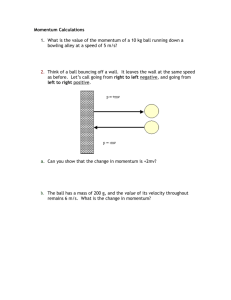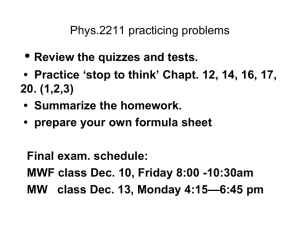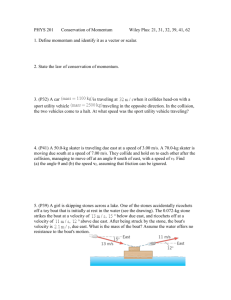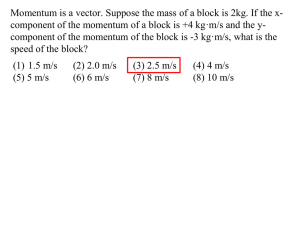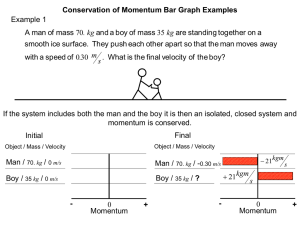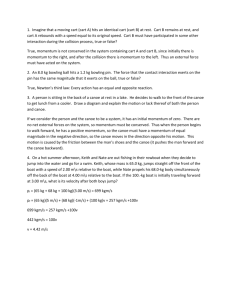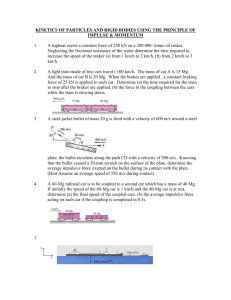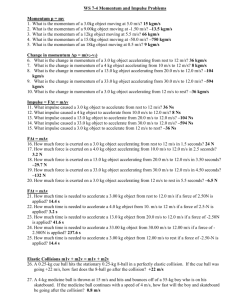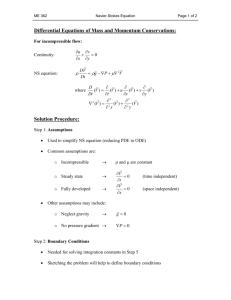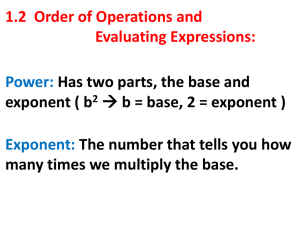Linear Momentum Review - Physics Problems & Solutions
advertisement
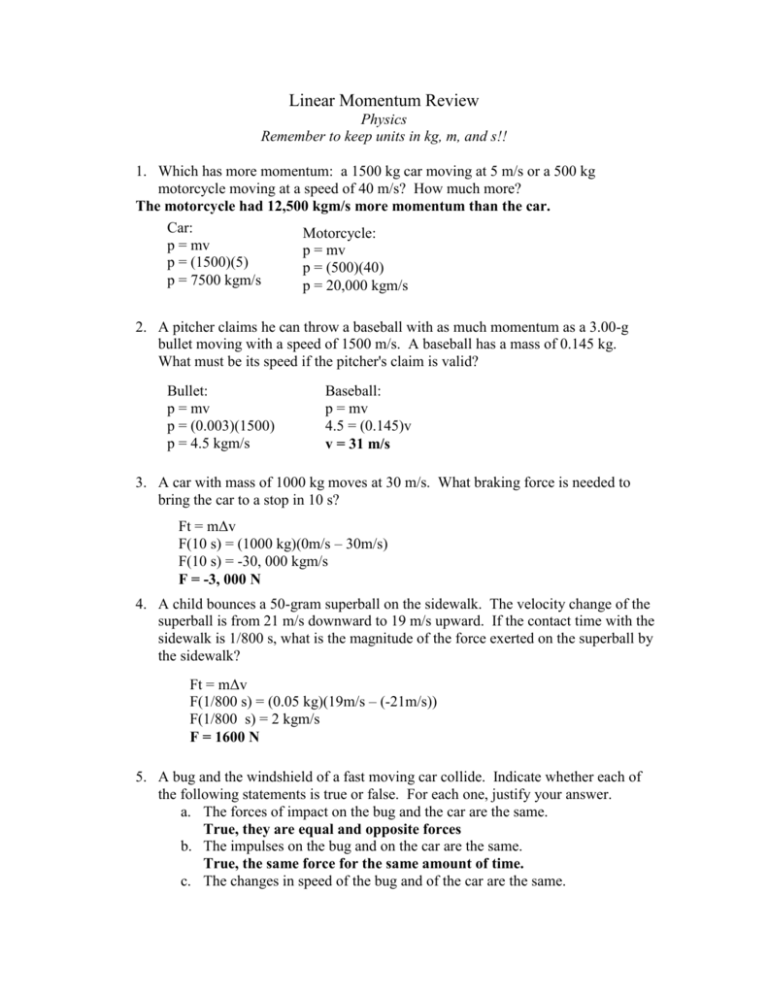
Linear Momentum Review Physics Remember to keep units in kg, m, and s!! 1. Which has more momentum: a 1500 kg car moving at 5 m/s or a 500 kg motorcycle moving at a speed of 40 m/s? How much more? The motorcycle had 12,500 kgm/s more momentum than the car. Car: Motorcycle: p = mv p = mv p = (1500)(5) p = (500)(40) p = 7500 kgm/s p = 20,000 kgm/s 2. A pitcher claims he can throw a baseball with as much momentum as a 3.00-g bullet moving with a speed of 1500 m/s. A baseball has a mass of 0.145 kg. What must be its speed if the pitcher's claim is valid? Bullet: p = mv p = (0.003)(1500) p = 4.5 kgm/s Baseball: p = mv 4.5 = (0.145)v v = 31 m/s 3. A car with mass of 1000 kg moves at 30 m/s. What braking force is needed to bring the car to a stop in 10 s? Ft = mΔv F(10 s) = (1000 kg)(0m/s – 30m/s) F(10 s) = -30, 000 kgm/s F = -3, 000 N 4. A child bounces a 50-gram superball on the sidewalk. The velocity change of the superball is from 21 m/s downward to 19 m/s upward. If the contact time with the sidewalk is 1/800 s, what is the magnitude of the force exerted on the superball by the sidewalk? Ft = mΔv F(1/800 s) = (0.05 kg)(19m/s – (-21m/s)) F(1/800 s) = 2 kgm/s F = 1600 N 5. A bug and the windshield of a fast moving car collide. Indicate whether each of the following statements is true or false. For each one, justify your answer. a. The forces of impact on the bug and the car are the same. True, they are equal and opposite forces b. The impulses on the bug and on the car are the same. True, the same force for the same amount of time. c. The changes in speed of the bug and of the car are the same. False, the bug has a smaller mass and therefore a much greater change of speed. d. The changes in momentum of the bug and of the car are the same size. True, impulse is the same as change in momentum, and their changes in speed are proportional to their masses. 6. A 50 kg football player traveling at 6 m/s tackles a 70 kg player who is heading towards her at a speed of 4 m/s. What is the velocity of the two entangled players after they hit? p0 = p1 (50 kg )(6 m/s) + (70 kg)(-4 m/s) = (50 kg)v + (70 kg)v 300 + (-280) = 120 v 0.167 m/s = v 7. A 6 kg fish swimming at 2 m/s swallows an absent-minded 1 kg fish at rest. a. What is the speed of the large fish immediately after lunch? p0 = p1 (6 kg )(2 m/s) + (1 kg)(0 m/s) = (6 kg)v + (1 kg)v 12 = 7 v 1.7 m/s = v b. What would its speed be if the small fish had been swimming toward the big fish at 4 m/s? p0 = p1 (6 kg )(2 m/s) + (1 kg)(-4 m/s) = (6 kg)v + (1 kg)v 12 + (-4)= 7 v 1.14 m/s = v 8. A 30-kilogram child moving at 4.0 meters per second jumps onto a 50-kilogram sled that is initially at rest on a long, frictionless, horizontal sheet of ice. Determine the speed of the child-sled system after the child jumps onto the sled. p0 = p1 (30 kg )(4 m/s) + (50 kg)(0 m/s) = (30 kg)v + (50 kg)v 120 = 80 v 1.5 m/s = v 9. After coasting at constant speed for a short time, the child from the previous question jumps off the sled in such a way that she is at rest. Determine the speed of the sled after the child jumps off it. p0 = p1 (30 kg )(1.5 m/s) + (50 kg)(1.5 m/s) = (30 kg)(0 m/s) + (50 kg)v 120 = 50 v 2.4 m/s = v 10. High-speed stroboscopic photographs show that the head of a golf club of mass 200 grams is traveling at 55 m/s just before it strikes a 46-gram golf ball at rest on a tee. After the collision, the club head travels (in the same direction) at 40 m/s. Find the speed of the golf ball just after impact. p0 = p1 (0.2 kg )(55 m/s) + (0.046 kg)(0 m/s) = (0.2 kg)(40 m/s) + (0.046 kg)v 11 = 8 + (0.046)v 65.2 m/s = v Momentum and Kinematics: 11. A 10-g bullet moving 1000 m/s strikes and passes through a 2.0-kg block initially at rest, as shown. The bullet emerges from the block with a speed of 400 m/s. To what maximum height will the block rise above its initial position? p0 = p1 (0. 01 kg )(1000 m/s) + (2 kg)(0 m/s) = (0.01 kg)(400 m/s) + (2 kg)v 10 = 4 + (2)v 3 m/s = v This 3 m/s will be its initial velocity and at the top it will have a final velocity of 0 m/s. v12 = v02 + 2aΔy 02 = 32 + 2 (-9.8) Δy 0.46 m = Δy 12. A 12-g bullet moving horizontally strikes and remains in a 3.0-kg block initially at rest on the edge of a table. The block, which is initially 80 cm above the floor, strikes the floor a horizontal distance of 120 cm from its initial position. What was the speed of the block and the bullet right after the collision? What was the initial speed of the bullet? First, we have to use projectiles to determine the speed of the block and bullet right after the collision, as they leave the table. Δy = v0t + ½ at2 - 0.8 = (0)t + ½ (-9.8)t2 0.404 s = t Δx = v0t + ½ at2 1.2 = v0 (0.404) + ½ (0)(0.404)2 2.97 m/s = v0 (after the collision as the block leaves the table) p0 = p1 (0. 012 kg )v + (3 kg)(0 m/s) = (0.012 kg)(2.97 m/s) + (3 kg)(2.97 m/s) (0. 012 kg )v = 8.97 745.5 m/s = v 2-D Problems: 13. A 3.0-kg mass sliding on a frictionless surface explodes into three 1.0-kg masses. After the explosion the velocities of the three masses are: (1) 9.0 m/s, north; (2) 4.0 m/s, 30 south of west; and (3) 4.0 m/s, 30 south of east. What was the magnitude of the original velocity of the 3.0-kg mass? x-direction: p0 = p1 (3.0 kg )(v) = (1 kg)(0 m/s) + (1 kg)(-4 cos30 m/s) + (1 kg)(4 cos30 m/s) 3v=0 0 m/s = v y-direction: p0 = p1 (3.0 kg )(v) = (1 kg)(9 m/s) + (1 kg)(-4 sin30 m/s) + (1 kg)(-4 sin30 m/s) 3v=9–2–2 1.67 m/s = v Its initial velocity was 1.67 m/s North 14. A 70-kg man who is ice skating north collides with a 30-kg boy who is ice skating west. Immediately after the collision, the man and boy are observed to be moving together with a velocity of 2.0 m/s, in a direction 37 north of west. What were the magnitudes of the man’s and the boy's velocities before the collision? x-direction: p0 = p1 (70 kg )(0) = (30 kg)(v) + (70 kg)(-2 cos37 m/s) + (30 kg)( -2 cos37 m/s) 30 v = -159.7 5.3 m/s = v for the boys initial velocity y-direction: (70 kg )(v) = (30 kg)(0) + (70 kg)(2 sin37 m/s) + (30 kg)(2 sin37 m/s) 70 v = 120.4 1.7 m/s = v for the mans initial velocity
